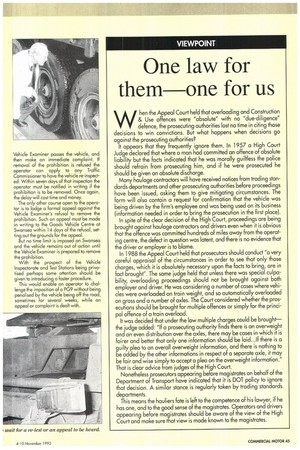One law for them one for us
Page 47

If you've noticed an error in this article please click here to report it so we can fix it.
hen the Appeal Court held that overloading and Construction & Use offences were "absolute" with no "due-diligence" defence, the prosecuting authorities lost no time in citing those decisions to win convictions. But what happens when decisions go against the prosecuting authorities? It appears that they frequently ignore them. In 1957 a High Court Judge declared that where a man had committed an offence of absolute liability but the facts indicated that he was morally guiltless the police should refrain from prosecuting him, and if he were prosecuted he should be given an absolute discharge. Many haulage contractors will have received notices from trading standards departments and other prosecuting authorities before proceedings have been issued, asking them to give mitigating circumstances. The form will also contain a request for confirmation that the vehicle was being driven by the firm's employee and was being used on its business (information needed in order to bring the prosecution in the first place). In spite of the clear decision of the High Court, proceedings are being brought against haulage contractors and drivers even when it is obvious that the offence was committed hundreds of miles away from the operating centre, the defect in question was latent, and there is no evidence that the driver or employer is to blame. In 1988 the Appeal Court held that prosecutors should conduct "a very careful appraisal of the circumstances in order to see that only those charges, which it is absolutely necessary upon the facts to bring, are in fact brought". The same judge held that unless there was special culpability, overloading proceedings should not be brought against both employer and driver. He was considering a number of cases where vehicles were overloaded on train weight, and so automatically overloaded on gross and a number of axles. The Court considered whether the prosecutions should be brought for multiple offences or simply for the principal offence of a train overload. It was decided that under the law multiple charges could be brought— the judge added: "If a prosecuting authority finds there is an overweight and an even distribution over the axles, there may be cases in which it is fairer and better that only one information should be laid.. .If there is a guilty plea to an overall overweight information, and there is nothing to be added by the other informations in respect of a separate axle, it may be fair and wise simply to accept a plea on the overweight information." That is clear advice from judges of the High Court. Nonetheless prosecutors appearing before magistrates on behalf of the Department of Transport have indicated that it is DOT policy to ignore that decision. A similar stance is regularly taken by trading standards departments. This means the hauliers fate is left to the competence of his lawyer, if he has one, and to the good sense of the magistrates. Operators and drivers appearing before magistrates should be aware of the view of the High Court and make sure that view is made known to the magistrates.




























































































